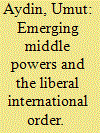| Srl | Item |
| 1 |
ID:
180367


|
|
|
|
|
| Summary/Abstract |
In the post-Cold War era, a number of middle powers rose to prominence thanks to domestic reforms and a favourable international environment of economic and political globalization. These countries began to pursue middle power foreign policies, working actively in international organizations, engaging in areas such as conflict mediation, humanitarian assistance and the promotion of human rights, and helping to diffuse democracy and market reforms in their neighbourhoods. In this way, they contributed to the stability and expansion of the liberal international order in the post-Cold War period. Nonetheless, recent democratic and economic backsliding in these middle powers raises concerns. Focusing on the cases of Turkey and Mexico, this article explores how reversals in democratic and market reforms, exacerbated by recent trends towards deglobalization, influence emerging middle powers' foreign policies and their potential contributions to the liberal international order. I argue that whereas their rise had helped reinforce and expand the liberal international order, emerging middle powers' illiberal turn may have a destabilizing effect on this order.
|
|
|
|
|
|
|
|
|
|
|
|
|
|
|
|
| 2 |
ID:
132530


|
|
|
|
|
| Publication |
2014.
|
| Summary/Abstract |
The Turkish economy has gradually liberalized and has become integrated into the regional and global economies since the 1980s. This article analyzes how the Turkish public evaluates the integration of the Turkish economy into the global economy, in particular, increasing trade ties, globalization, greater availability of foreign products and travel opportunities, the impact of multinational companies and international financial institutions. The evidence from Pew Global Attitudes Surveys shows that the Turkish public is overwhelmingly positive about certain changes such as increasing trade and availability of foreign products, whereas they are overwhelmingly negative about others such as the impact of multinationals and of immigration. Regression analyses demonstrate that these attitudes are shaped by individuals' perceptions of whether they have benefited from the liberalization of the economy.
|
|
|
|
|
|
|
|
|
|
|
|
|
|
|
|